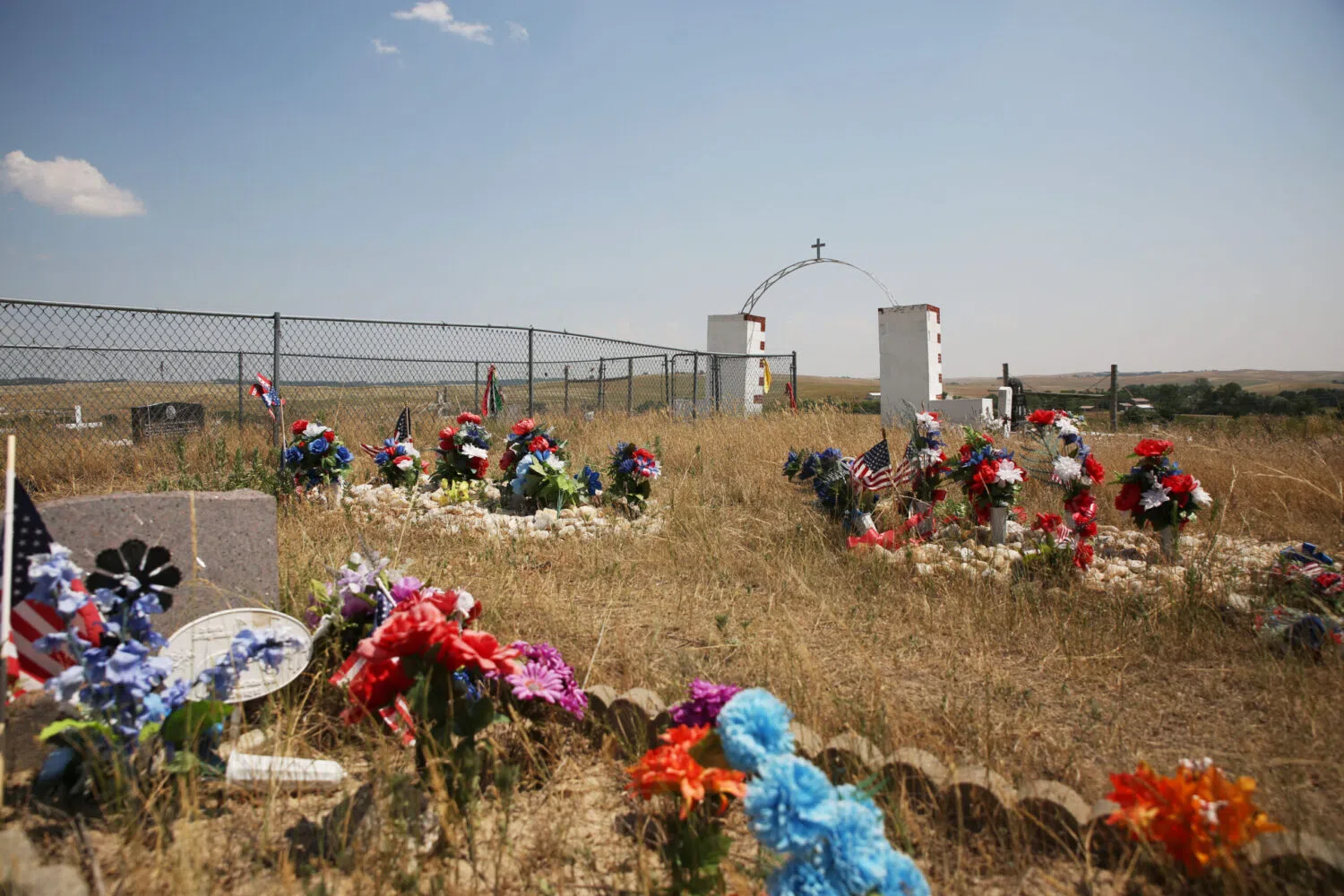
Plastic flowers and American flags are placed atop graves at the Wounded Knee Memorial and cemetery on June 30, 2024. (Makenzie Huber/South Dakota Searchlight)
By: Makenzie Huber and Seth Tupper
WOUNDED KNEE, S.D. (South Dakota Searchlight) – As the 134th commemoration of the Wounded Knee Massacre nears, efforts to protect the massacre site and review medals awarded to participating soldiers are in limbo.
After years of activism by Lakota people, the U.S. Department of Defense announced in July that the “approximately 20” Medals of Honor awarded to soldiers who participated in the massacre would be subjected to a review. But there hasn’t been an announcement of the review panel’s recommendations yet, and President Joe Biden’s term ends Jan. 20 when President-elect Donald Trump takes the oath of office.
The massacre occurred on Dec. 29, 1890. Lakota people were camped near Wounded Knee Creek on the Pine Ridge Reservation in southwestern South Dakota, where they were surrounded by hundreds of Army soldiers. A shot rang out while the soldiers tried to disarm the camp, and chaotic shooting ensued.
Fewer than 40 soldiers were killed (some by friendly fire, according to historians), while estimates of Lakota deaths ran from 200 to 300 or more, depending on the source. After some of the bodies froze on the ground for several days, a military-led burial party dumped them into a mass grave.
The politics and racism of the day influenced the Army’s decision to support medals for some of the soldiers, even though Maj. Gen. Nelson Miles condemned the massacre. He led the Division of the Missouri, which included the soldiers who were responsible for the incident.
“I have never heard of a more brutal, cold-blooded massacre than at Wounded Knee,” Miles wrote in an 1891 letter that’s now held in an archive at Yale.
Advocate hopeful that Biden will revoke medals
Historians have noted that the records associated with some of the medals are incomplete or unclear. Oliver “OJ” Semans, a Rosebud Sioux tribal member who advocates for the revocation of the medals, said he’s been told the review panel could not reach a consensus.
He remains hopeful that President Joe Biden will revoke the medals, perhaps before or in conjunction with Sunday’s 134th commemoration of the massacre.
“That would be such a mental relief for all of those descendants of the massacre survivors,” Semans said.
While Biden was running for president in 2020, Semans’ Four Directions voter-rights advocacy group submitted written questions to the candidate, including one about the Wounded Knee medals. Biden said at the time that he supported revoking the medals.
“The Congressional Medal of Honor is our Nation’s highest award for gallantry in combat, in defense of our Nation’s highest ideals and principles,” Biden wrote in January 2020, according to a copy of the letter provided by Semans. “That this medal was awarded for the massacre of hundreds of unarmed Native Americans, including women and children, is abhorrent to those very ideals and lessens what the award represents in integrity and personal sacrifice for all others who have received it.”
The review panel included members from the Department of Interior. A spokesperson for that department declined to comment on the status of the review. A spokesperson for the Department of Defense said only that the review panel would provide its recommendations to the secretary of Defense, the secretary would provide recommendations to the president, and “the authority to award or rescind a Medal of Honor resides with the President of the United States.”
Land bill caught up in dispute over Lumbee recognition
Meanwhile, an effort to push the Wounded Knee Massacre Memorial and Sacred Site Act through Congress failed in November after one senator opposed the bill. The effort to protect 40 acres at the Wounded Knee Massacre site on behalf of the Oglala Sioux Tribe and Cheyenne River Sioux Tribe will have to start over after the 119th Congress begins on Jan. 3.
Two years ago, the two tribes purchased 40 acres at the massacre site from a private owner. The legislation would place the land in restricted-fee status, which means it could not be sold, taxed, gifted or leased without approval by the secretary of the Department of Interior.
The bill passed the House in September after Rep. Dusty Johnson, R-South Dakota, introduced it in May 2023. U.S. Sen. Mike Rounds, R-South Dakota, who introduced a Senate version of the bill in June 2023, tried to have the adopted House version considered by the Senate in November.
“I hope that we can come together to acknowledge this event and work to mend our history through reconciliation and mutual respect,” Rounds said on the Senate floor. “Although we can’t rewrite this past, this act is one way to show healing and progress.”
Sen. Thom Tillis, R-North Carolina, took advantage of Senate rules allowing a single senator to block consideration of a bill.
Tillis has opposed several tribal-related bills in an attempt to get senators to support his own bill to federally recognize the Lumbee Tribe in North Carolina. He called out the leaders of the Oglala and Cheyenne River Sioux tribes for allegedly not supporting his efforts.
During a Senate floor speech, Tillis directed his comments to the people of the two tribes in South Dakota.
“This is not about you. This is about your leaders and their underhanded, unfair treatment of a tribal nation that deserves recognition,” Tillis said. He added that the Wounded Knee bill “really does need to come into law. Just not yet.”
Oglala and Cheyenne River Sioux tribal leaders did not respond to questions from South Dakota Searchlight on the issue.
Semans said Tillis and the Lumbee were wrong to subject the Wounded Knee land protection bill to a fight over the Lumbee’s status.
“It’s a terrible thing that they decided to pick one of the most horrific massacres in history to make a point about them wanting to become a federally recognized tribe,” Semans said.
Congress recognized the Lumbee in 1956, but denied financial benefits typically associated with federal recognition, such as funding for tribal law enforcement and access to the Indian Health Service.
The tribe has worked toward full recognition for decades, most recently with the North Carolina congressional delegation. Tribal nations typically receive federal recognition through an application with the Department of the Interior. President-elect Donald Trump pledged his support to the tribe in September.
Some other tribal leaders question the validity of the Lumbee’s historical claims, according to The Associated Press. Some opponents of Lumbee recognition are concerned it could siphon funding away from existing tribes, and also have concerns that recognition would allow the Lumbee to build a casino, which would compete with other tribal casino operations in the area.
The latest action on Tillis’ Lumbee recognition bill was its referral to the Committee on Indian Affairs after the legislation was introduced in February 2023.




Comments